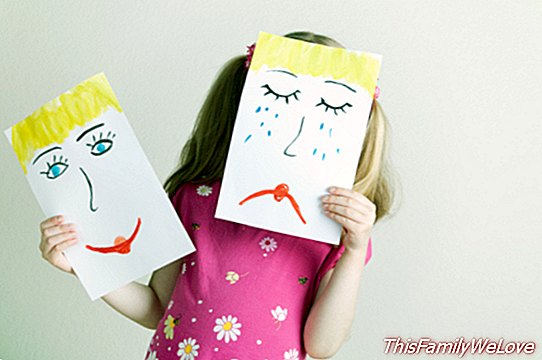Depression, is it a child thing?
There is childhood depression? Are children vulnerable to these symptoms? The answer is yes. With a prevalence around 3 percent, childhood depression It is a frequent reason for consultation. However, a depressed child is difficult to identify. The symptoms of a child and an adult with depressed mood are completely different.
Infantile depression: observe the symptoms through the game
The characteristic symptoms of childhood depression They can be classified into three areas: health, social environment and school area.
1. In the area of health, The most characteristic symptoms of childhood depression are lack of toilet training, frequent headaches and stomach pains, skin problems and difficulties in breathing. Also alterations in sleep and appetite.
2. In the social area, the depressed child He usually shows isolation and aggressiveness with the people around him, as well as loss of interest in activities that were previously attractive to him.
3. In the school area there is a strong refusal to attend school, presenting difficulties of attention and concentration to carry out school activities. They can present anxiety reactions to the separation of their parents, with crying and significant discomfort, showing much concern and fear.

The adult is able to manifest their needs, make explicit their complaints and demand help explaining their mood. The child has difficulties to recognize and communicate his ideas and thoughts. This difference is fundamental to explain the difference of symptoms between the depressed adult and the child.
The game is the language used by the child. By observing how he plays we can appreciate and know the state of mind in which he is. Thanks to this observation, and also to the interaction with others during the process, we can see how it is.
It is common among adults to think that children can not be depressed. They are careful, they play, and parents tend to protect them from the bad things that can happen to them. So the following is stated. "If my child has depression, what have I done wrong?"
Initially the adults who surround the child, parents, teachers and people close, look for other causes. The knowledge of these symptoms plays an important role. The more attention you give to your diagnosis, the sooner you can intervene with the child.
Symptoms of childhood depression
- Irritability, frequent tantrums without reason.
- Low motivation before the game.
- Excessive boredom.
- Refusal to attend school.
- Difficulties in concentration and attention.
- High motor activity.
- Difficulty to reach the weight that corresponds to its evolutionary development.
- Difficulties in sleep.
- Frequent complaints about body aches.
- Signs of aggressiveness, scratches without apparent explanation.
What is the origin of childhood depression?
Depression may be of biological origin, or as a consequence of a lived event. Children are reactive to what they see and live, listen and perceive.
Children listen, come and, above all, feel. They play, they laugh and, above all, they enjoy. They are part of the family: conjugal conflicts, health problems and day-to-day difficulties of the rest of the family members also exist. It is important to promote communication and be attentive to the signals that give us information on how they are.
The child needs the adults who surround him and know him, strengthen his strengths and help him through motivation to improve their weaknesses. The expression of their feelings in a safe environment such as home, and the use of various resources such as writing and drawing are attractive to them.
The child learns through observation and experience how to behave with himself, with the environment that surrounds him and also with the future. They learn and internalize the working patterns in day to day, acquire skills and show difficulties. The role of parents, friends and teachers is essential for a correct adaptation and happiness of the child.
Points to think or suspect of a childhood depression
- The expression of my son in the game reflects what his mood is. How do you play?
- Showing boredom and low motivation, excessive fatigue and body aches or sleep disturbances are symptoms to observe. Does my child have any of them?
- Tantrums are a mode of communication for children. Are they frequent in him?
- Has a stressful life event recently occurred around the child? If so, what have I communicated to him?
How to act in case of child depression
- Provides the child with information that he or she is capable of understanding. Children, even if they are unable to explain their state of mind as adults, are able to understand what is happening around them.
- Pay special attention to the child's behavior while playing. The lack of games with peers, refusal to go to school and lack of interest in games that he usually liked are clear symptoms of the state of mind.
- Fosters the expression of feelings. If parents validate through dialogue the occurrence of difficulties and problems, the child will learn to express their emotions. Parents are the model and reference that children have.
- Consultation with a professional. If your child has any of the symptoms that appear in the previous table.
- It promotes activities that the child likes: do sports, walk, be outdoors, etc.
María Martín Vivar.Psychologist Unit of Psychiatry and Psychology of Children and Adolescents




